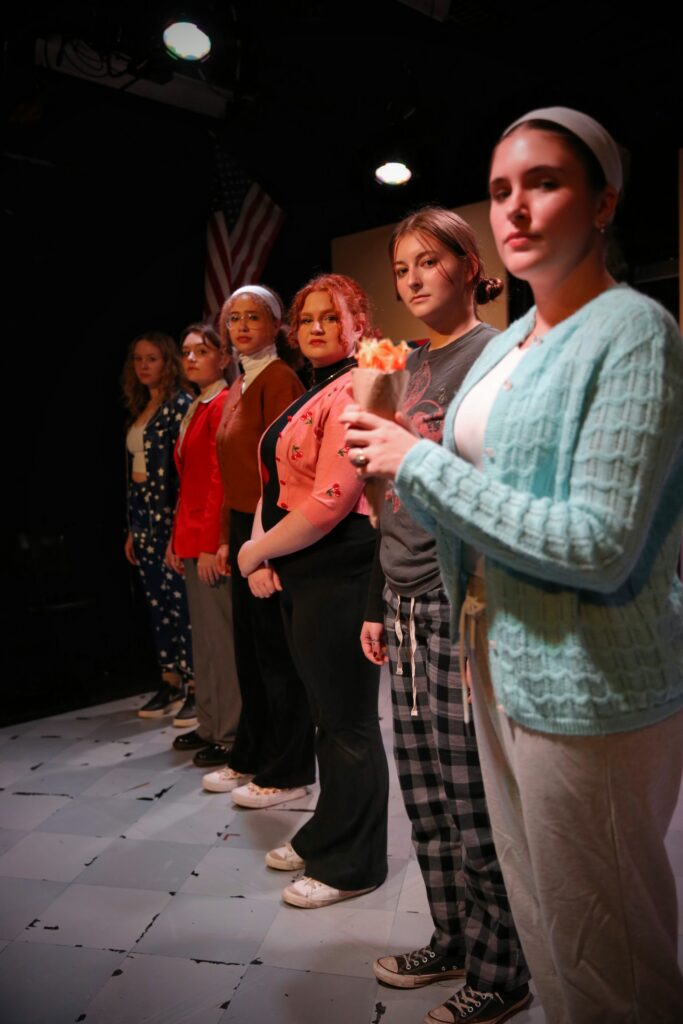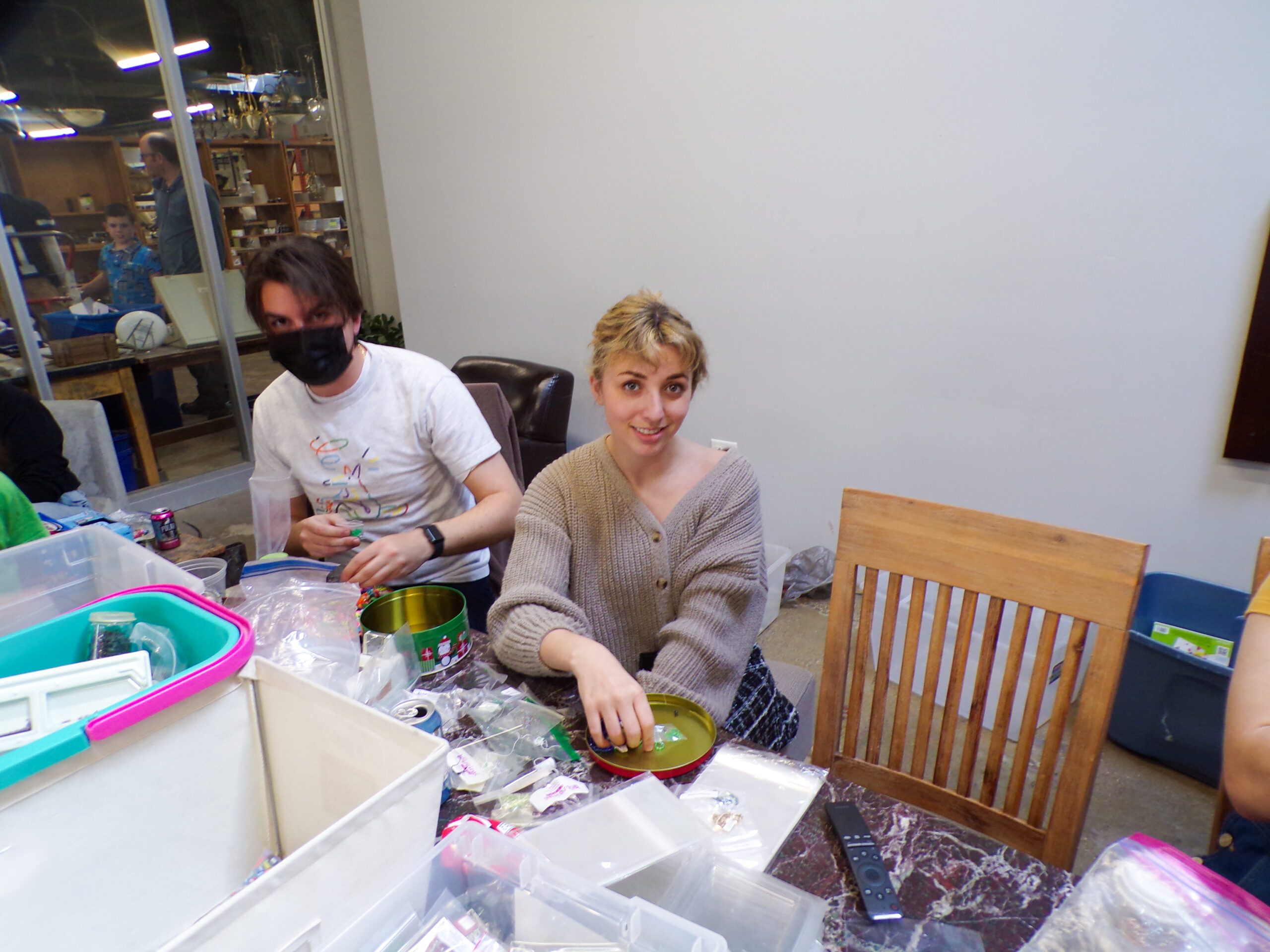The student-led production tackles the role of youth in the political process.
As social activism reaches a critical juncture, Loyola’s Underground Laboratory Theatre has emerged as a humorous catalyst for change. The spirit of U.S. Representative Alexandria Ocasio-Cortez loomed in the air as the theater put on its new second-stage project, captivating audiences and inspiring them to take charge.
Second-stage production’s goal is to expand student-led projects. Everything, from start to finish, is written and produced by the students, according to Loyola’s Underground Laboratory.
Directed by fourth-years Grace Herman and Annika Halonen, “In AOC We Trust” explores themes of responsibility, activism and hope. Set in the confines of Nettleton High School’s Advanced Placement U.S. History classroom, the project is an absurdist commentary on the broken American childcare system and governmental negligence.
In the limited space of the Mundelein basement, Herman and Halonen produced a 90-minute show with six cast members representing Nettleton’s first non-male Student Council — Sawyer, Delilah, Edith, Janelle, Danny and Gwen.
The six council members are caught between their roles as student leaders and their broader responsibilities to help their underpaid and unsupported teacher as she reaches maternity leave.
The project is visually striking and thematically layered, incorporating humor, silence and visual elements to point to the main idea — there’s a flame of hope when change is sparked.
The characters navigate both their roles in student government and their personal battles with expectations and systemic constraints.
“The title of the play looms over the show,” Herman said. “We don’t ever talk about AOC, AOC is just on the wall. It’s this looming presence of the U.S. government and the politicians we admire and politicians we don’t.”
With the elections coming up, Herman said many adults are branding students and youth as responsible for the outcome.
“People are like, ‘This is your election’” Herman said. “‘Your voting bloc is the one that’s going to swing it one way or another — you have all the power to change it.’ But how much power do they really have?”
Herman said the project encapsulates the wavering nature of hope in a politically-charged and disillusioned time.
“Hope really travels,” Herman said. “Sometimes we have it, sometimes we don’t, and that feels very potent right now.”

In the play, when Danny learns Mrs. Blake was denied financial assistance from the school board, they ask the council for help but are met with skepticism. By the time they agree to chip in for Mrs. Blake, it’s too late — she’s already resigned in defeat.
Halonen said the girls worked to help Mrs. Blake and through their collaboration, sparked a sense of hope.
“How do you find hope in community and when does that become too much?” Halonen said. “When does reliance start to break down a community? Those questions seem to fall on young people and what a difficult task that can become.”
One of the most striking elements of “In AOC We Trust” is its meticulous attention to visual detail.
The recurring motif of paper symbolizes bureaucratic red tape and overwhelming responsibilities. Documents from Mrs. Blake’s desk reveal her financial situation, manuscripts get thrown in the air after Mrs. Blake signs her resignation letter and paper is pushed around the ground and frantically picked up in moments of panic.
Herman said the challenges of working with props like paper united the cast.
The team resorted to picking the paper up by adding choreography to demonstrate a moment of chaos. During moments of anxiety, Edith or Delilah would frantically pick them up.
Flickering lights and scenes of Gwen coping with her social anxiety allowed moments of silent reflection.
“Those scenes with no words allow the audience to project their own experiences onto them,” Herman said. “There’s a lot of anxiety in the world right now, and seeing characters process that on stage makes the audience think.”
To offset the weighty themes, the project plays with humor, which Herman said is an essential part of social commentary.
“I think plays that are social justice oriented that are solely serious and say ‘here’s everything wrong with the world’ will make audiences check out,” Herman said. “But humor allows the audience to connect with the characters personally.”
The performance concludes with Mrs. Blake leaving and the students clearing out her classroom. As each of the students tear down the posters on the wall, Delilah is left alone. She takes AOC’s picture off the wall, looks at it one last time and exits the stage.
In the final moments, the cast passes the National Honor Society torch to each other before extending it to a random audience member.
“I want audiences to leave questioning their role in change especially within the context of the US government,” Herman said.
Visit the Loyola University Fine and Performing Arts website to purchase tickets for future second-stage productions. Poseidon’s Priestess Preview is the upcoming show and will be premiering Nov. 16 – Nov. 17.
-

Noman is a first-year neuroscience and English double major. When not reviewing books or writing about music, Noman enjoys reading, writing poetry, drinking coffee, and watching Young Sheldon. She loves exploring new narratives and capturing the heart of campus stories with a focus on culture and the arts.
View all posts











